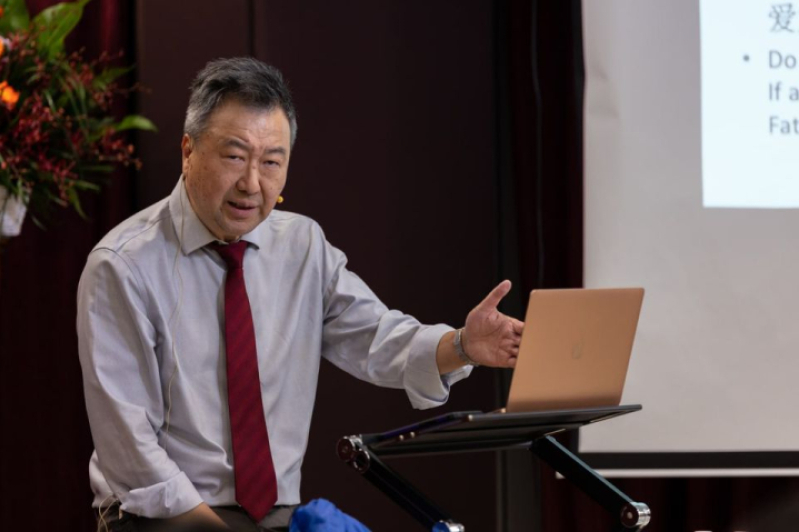
Renowned Chinese scholar and pastor Dr. Stephen Chen (陈佐人) shared in a recent lecture St. Augustine’s relationship with modern liberalism and political theology. From there, he reflected on how these theories have impacted different cultural and political contexts. Chen exhorted Chinese Christians to avoid simplifying the complex discussion of modern political theology and to think critically amidst the diverse political landscape today.
Many Chinese churches have a misunderstanding of the relationship between “Christ and Culture”, Chen said, and it is especially evident in the interactions Christianity has with secular culture. He suggests that Chinese churches in the U.S., Canada, Australia, Singapore, and more should be inspired by classic works such as those from Augustine and reflect on their own situations.
Chinese Scholarship Increasingly Emphasizing Augustinian Thought
The enthusiasm Chinese scholars have towards Augustine is greater than that of any modern theologians and founding fathers. In the past decade, academic research done by Dr. Dongqi Xia (夏洞奇) from Fudan University and Dr. Fei Wu (吴飞) from Peking University has been especially notable, their writings gaining widespread attention. Their works have often been cited in Chen’s research process. In recent years, new Chinese scholars have risen prolifically, publishing related research results yearly at astonishing rates.
The famous phrase from Book IV of “The City of God”, “Without justice, kingdoms are mere robberies,” has stirred much discussion in academia. However, as both Xia and Wu have pointed out, that is not the core point of Augustine’s “The City of God”, and should not be singled out as its summary. Many Western scholars also believe it was a simple mention Augustine made, not to represent his stance as discussed through the work. Augustine used many examples to explain his points, but more often than not, these examples do not represent the core of his point. In other words, the examples these great thinkers use can mislead the reader.
Augustine’s “The City of God” listed many political ideologies, especially in his discussion of state and society. Scholars have categorized these ideas into four to five distinct perspectives, out of which the most impossible is that the state is always the robber. And interestingly, Augustine's view of politics in Book XIX, which emphasizes the sovereignty of the state and the high moral character of the populace which is superior to anarchy, provided the theoretical basis for later schools of political history. For example, American theorist Forbes’ political principles, Augustine’s realism, and Harvard scholar John Rawls’ theory of civic politics are all related to the discussion laid out in his book.
The study of Augustine has seen particularly significant advancement in the United States, a trend that stands out in contrast to its relatively subdued presence in countries like the United Kingdom, France, and Germany. American scholars have spearheaded a distinctive development of Augustinian political theology, diverging from the traditional European academic approach. In fact, Augustine’s political theology has been further interpreted and applied within the U.S., becoming a significant focus of research, especially within law schools.
Book XIX is often regarded as the centerpiece of The City of God, offering a critical examination of classical teleology while introducing a Christian perspective on purpose and peace. In this section, Augustine delves deeply into the Christian concept of peace, reflecting on and critiquing Roman imperial classicism. The City of God has become a foundational text within law school curricula, particularly its discussions on law and political philosophy. These insights have solidified Augustine's work as a cornerstone in Western legal education, shaping how students engage with the intersections of law, morality, and theology.
Augustine’s political theology has shaped Western academia and gained prominence in scholarly research in regions like China and beyond. By deeply engaging with "The City of God", particularly its pivotal nineteenth book, pastors and scholars alike can better appreciate Augustine’s contributions to political philosophy. His work offers a profound critique of classical thought through a Christian lens, reshaping the framework of political theory in ways that continue to resonate across cultures and disciplines.
Augustinian Thought in Modern Political Theology and Sociology
Chen likens Book XIX of "The City of God" to a miniature encyclopedia, addressing a wide range of topics such as the individual, family, friendship, slavery, and the city-state. This highlights Augustine’s integration of Christian concepts of peace into political philosophy. While Book XIX does not directly address many themes of modern political philosophy, it remains one of the most influential texts in Western political thought and political theology.
There are also varying interpretations of Augustine's influence, especially regarding the concept of "secularization" or "de-sacralization," said Chen. These discussions explore Augustine’s view of the relationship between Christianity and the Roman Empire, as well as his critique of classical teleology in favor of Christian teleology. He refers to the scholar Marcus, who proposed the idea of "de-sacralization," and emphasizes that Augustine’s relationship with the Roman Empire should not be seen as a simple "secularization" but rather as a discontinuous process, characterized by the conflict between Christians and the empire.
Some scholars support this view, arguing that the relationship between Christianity and the Roman Empire was not a natural process of secularization, but rather a qualitative transformation that occurred with the flow of history. Chen also mentions Peter Brown’s study of Manichaeism, noting that Augustine’s Confessions reflect his relationship with Neoplatonism and the personal reflections he made on this connection. Brown, known for his anti-Manichaean stance, emphasizes the significance of the relationship between ancient Christianity and Neoplatonism.
In discussing Milbank’s work Theology and Social Theory, Chen highlights Milbank's sociological interpretation of Augustine’s thought, particularly in the context of postmodernism. Milbank argues that Augustine’s theology provides a theological foundation for modern Christianity to engage with postmodernism. This contrasts with Marcus’ view, as Milbank sees Augustine’s influence as a positive, modern force rather than a negative "disruption."
Chinese Church to be inspired by the classic and apply to different cultural and political backgrounds
Chen emphasizes that the value of “The City of God" as a classic work lies not in adhering to a single political stance, but in its ability to inspire reflection among Christians in diverse cultural and political contexts. Chinese Christian scholars and believers should avoid equating their current circumstances with Augustine’s ancient world. In Augustine’s time, there was no "church-state unity" in the modern sense, and his thoughts should not be directly applied to the political structures of contemporary society.
While scholars of Augustine may bring their own political viewpoints to their interpretations of “The City of God", their approaches are not overly simplified or biased toward any one position, as seen in works like “Christ and Culture”. Chen notes that many Augustine scholars, including Gregory and Marcus, strive to deepen the understanding of “The City of God” through multifaceted academic discussions, avoiding narrow or one-sided interpretations.
“The City of God” is not only a profound reflection on the ancient Roman Empire but also serves as a guide for Christianity in the modern world. Chen concludes by stressing that Christians should respond to contemporary political issues rationally and flexibly, grounding their actions in the foundation of their faith.







